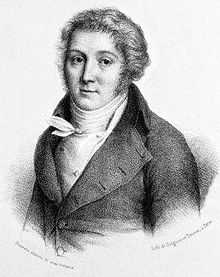Nina (Dalayrac)
| Nicolas Dalayrac |
|---|
 |
|
Operas
|
Nina, ou La folle par amour (Nina, or The Woman Crazed with Love) is an opera in one act by the French composer Nicolas Dalayrac. It was first performed at the Comédie-Italienne in Paris on 15 May 1786. The libretto, by Benoît-Joseph Marsollier des Vivetières, is based on a short story by Baculard d'Arnaud.
Background and performance history
Nina was Dalayrac's first collaboration with Marsollier des Vivetières, who would go on to write many more librettos for him, including Les deux petits savoyards. Following its premiere at the Comédie-Italienne on 15 May 1786, Nina was a popular success and remained so in Paris until the mid-19th century. It was also performed in translation in London and Hamburg in 1787 and in Italy in 1788.[1][2] It was revived again for Paris as late as 1852.[3]
Its most famous aria, "Quand le bien-aimé reviendra" ("When my sweetheart returns to me"), is mentioned by Hector Berlioz in his Memoirs as his "first musical experience" (he heard an adaptation of the melody sung during his First Communion.)[4][5] In 1813 Dalayrac's score for Nina was adapted as a ballet by Louis Milon and Louis-Luc Loiseau de Persuis with Émilie Bigottini in the title role. In the ballet version, "Quand le bien-aimé reviendra" is played as a solo for cor anglais. It was at one of the early performances of this ballet that Berlioz remembered the melody he had heard in his childhood..[4] Giovanni Paisiello had also set the libretto in an Italian version adapted by Giambattista Lorenzi. Paisiello's Nina, which premiered in 1789 is still performed today, while Dalayrac's has fallen into obscurity.
Roles
| Cast[6] | Voice type | Premiere, 15 May 1786 |
|---|---|---|
| Nina | soprano | Louise Dugazon |
| Count Lindoro | tenor | |
| Germeuil | tenor | |
| Mathurine | mezzo-soprano | Marie Crétu-Simonet |
| Georges | baritone | |
| A musician | ||
| A second musician | ||
Synopsis
Nina is in love with Germeuil but her father, Count Lindoro, favours another suitor. Germeuil and his rival fight a duel. Nina believes that Germeuil has been killed and goes mad, forgetting aspects of the traumatic incident in a manner consistent with a diagnosis of psychogenic amnesia.[7] She only regains her reason when Germeuil reappears unharmed and her father finally allows him to marry her.
Recordings
Although there are no full-length recordings of Nina, its most famous aria, "Quand le bien-aimé reviendra", can be heard on Serate Musicali (Joan Sutherland (soprano), Richard Bonynge (piano), Decca, 2006)
References
- ↑ Bampton Classical Opera (1999). Programme Notes for Giovanni Paisiello: Nina
- ↑ Castelvecchi, Stefano (1996)."From "Nina" to "Nina": Psychodrama, Absorption and Sentiment in the 1780s". Cambridge Opera Journal, Vol. 8, No. 2 (July 1996), pp. 91-112 (subscription required)
- ↑ Loewenberg (1943), Annals of Opera
- ↑ 4.0 4.1 Berlioz, Hector (1966). Memoirs of Hector Berlioz: From 1803 to 1865 translated and edited by Eleanor Holmes and Ernest Newman. Courier Dover Publications, p. 21. ISBN 0-486-21563-6
- ↑ Kelly, Barbara L. and Murphy, Kerry eds. (2007). Berlioz and Debussy: Sources, Contexts and Legacies. Ashgate Publishing, p. 4. ISBN 0-7546-5392-7
- ↑ Cast list from Casalia, Gherardo (2005). "15 Maggio 1786". Almannaco Amadeus. (Italian)
- ↑ Goldsmith, R.E., Cheit, R.E., and Wood, M.E. (2009) Evidence of Dissociative Amnesia in Science and Literature: Culture-Bound Approaches to Trauma in Pope, Poliakoff, Parker, Boynes, and Hudson (2007). Journal of Trauma & Dissociation, Volume 10, Issue 3 July 2009, pp. 237 - 253, doi:10.1080/15299730902956572
- Further sources
- The Viking Opera Guide ed. Holden (Viking, 1993)
- Charlton, David (1992), 'Nina, ou La folle par amour' in The New Grove Dictionary of Opera, ed. Stanley Sadie (London) ISBN 0-333-73432-7
External links
- Libretto in the original French.